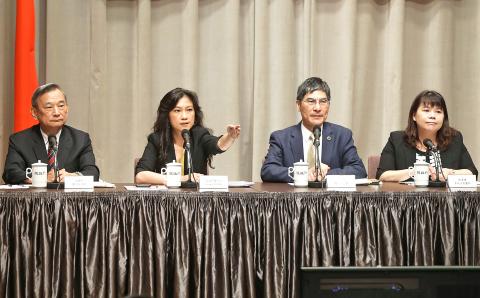The Cabinet yesterday passed draft amendments to the Act Governing Relations Between the People of the Taiwan Area and the Mainland Area (台灣地區與大陸地區人民關係條例) that would increase fines for Chinese or Chinese institutions that illegally invest in Taiwan.
The draft bill has been listed as a priority for the current legislative session.
Under the proposed amendments, any Chinese investor or enterprise that invests in Taiwan without getting permission from the authorities could be subject to a fine ranging from NT$50,000 to NT$25 million (US$1,633.88 to US$816,940), compared with the current range of NT$120,000 to NT$600,000, plus rectification.

Photo: CNA
Failure to rectify the matter could lead to consecutive fines until the situation is remedied.
The Mainland Affairs Council was prompted to amend the law by a 2016 case in which Chinese investors purchased about NT$1 billion of Tatung Co (大同) shares through SinoPac Securities (Asia) Ltd (永豐金證券亞洲), a Hong Kong-based brokerage subsidiary of SinoPac Financial Holdings Co (永豐金控), in a breach of the rules governing cross-strait investments, MAC Deputy Minister Lee Li-jane (李麗珍) told a news conference at the Executive Yuan in Taipei.
The Chinese investors were fined just NT$600,000 under Article 93-1 of the act, which drew public protests and calls for change, Lee said.
The fines could also be increased depending on the amount of profits made through investments deemed to be illegal, Deputy Minister of Justice Chen Ming-tang (陳明堂) told the news conference.
“If a Chinese person or institution made more than NT$25 million in profit from such illegal investments, Item 2, Article 18 of the Administrative Penalty Act (行政罰法) would allow the government to raise the fine to the amount of the illegal gain,” Chen said.
For instance, if a Chinese investor was found to have made NT$100 million from an illegal investment in Taiwan, they could face a maximum fine of NT$100 million, Chen said.
Under the proposal, any Chinese enterprise allowed to invest in Taiwan that contravenes the rules — such as failure to file financial statements and illegally reinvesting — could face a fine ranging from NT$50,000 to NT$2.5 million, up from the original range of NT$60,000 to NT$300,000.
The proposed amendments include a provision to punish any Chinese enterprise that evades, impedes or refuses inspections by the authorities.
Another provision would allow minor violators of the law to be exempted from fines if they are able to remedy the situation within a specified time period.

UKRAINE, NVIDIA: The US leader said the subject of Russia’s war had come up ‘very strongly,’ while Jenson Huang was hoping that the conversation was good Chinese President Xi Jinping (習近平) and US President Donald Trump had differing takes following their meeting in Busan, South Korea, yesterday. Xi said that the two sides should complete follow-up work as soon as possible to deliver tangible results that would provide “peace of mind” to China, the US and the rest of the world, while Trump hailed the “great success” of the talks. The two discussed trade, including a deal to reduce tariffs slapped on China for its role in the fentanyl trade, as well as cooperation in ending the war in Ukraine, among other issues, but they did not mention

Japanese Prime Minister Sanae Takaichi yesterday lavished US President Donald Trump with praise and vows of a “golden age” of ties on his visit to Tokyo, before inking a deal with Washington aimed at securing critical minerals. Takaichi — Japan’s first female prime minister — pulled out all the stops for Trump in her opening test on the international stage and even announced that she would nominate him for a Nobel Peace Prize, the White House said. Trump has become increasingly focused on the Nobel since his return to power in January and claims to have ended several conflicts around the world,

GLOBAL PROJECT: Underseas cables ‘are the nervous system of democratic connectivity,’ which is under stress, Member of the European Parliament Rihards Kols said The government yesterday launched an initiative to promote global cooperation on improved security of undersea cables, following reported disruptions of such cables near Taiwan and around the world. The Management Initiative on International Undersea Cables aims to “bring together stakeholders, align standards, promote best practices and turn shared concerns into beneficial cooperation,” Minister of Foreign Affairs Lin Chia-lung (林佳龍) said at a seminar in Taipei. The project would be known as “RISK,” an acronym for risk mitigation, information sharing, systemic reform and knowledge building, he said at the seminar, titled “Taiwan-Europe Subsea Cable Security Cooperation Forum.” Taiwan sits at a vital junction on

LONG-HELD POSITION: Washington has repeatedly and clearly reiterated its support for Taiwan and its long-term policy, the Ministry of Foreign Affairs said US Secretary of State Marco Rubio yesterday said that Taiwan should not be concerned about being used as a bargaining chip in the ongoing US-China trade talks. “I don’t think you’re going to see some trade deal where, if what people are worried about is, we’re going to get some trade deal or we’re going to get favorable treatment on trade in exchange for walking away from Taiwan,” Rubio told reporters aboard his airplane traveling between Israel and Qatar en route to Asia. “No one is contemplating that,” Reuters quoted Rubio as saying. A US Treasury spokesman yesterday told reporters